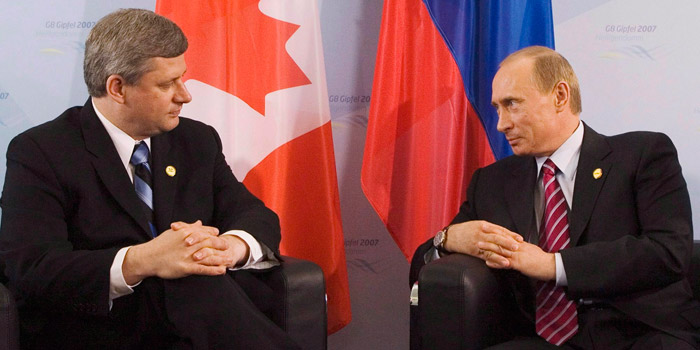Stephen Harper made international headlines last week after firing a bold political jab at Vladimir Putin during the G20 summit in Brisbane.As reported by Harper’s spokesperson, when Putin walked up to him for a handshake on the opening day of the summit, Harper allegedly said, “I guess I’ll shake your hand, but I have only one thing to say to you: You need to get out of Ukraine.”
Since then, many media outlets have praised the prime minister as a hero who passionately stood up to a major imperialistic threat. However, recent history demonstrates that impassioned, principled stands are not really what Canada has come to know from its prime minister in the past few years. The political motive behind his verbal attack on Putin is not hard to figure out.
Following its belligerent occupation of Crimea, Russia has broken many international humanitarian laws, one example being its enforcement of Ukrainians to take Russian citizenship. Therefore, it is no surprise that the majority of Canadians are in strong support of the sovereignty of Ukraine. Furthermore, this sentiment is echoed even louder by the Ukrainian-Canadians who make up over 1.2 million of the population, making them the ninth biggest ethnic group in Canada. By taking a solid stance on the issue and bringing it widespread attention, Harper is effectively pandering to the majority of Canadians. It goes without saying that this move has the potential to be a political boon ahead of next year’s federal election.
What is possibly even more significant is that Harper’s headline grabbing attack took media attention away from another issue which is important to many Canadians—the environment. Climate change was a recurring presence at the summit. Most notably, the United States made a pledge to donate $3 billion to help the world’s poorest countries reduce emissions and adapt to climate change. This was followed by Japan’s $1.5 billion pledge. Following the summit, many European countries made similar commitments at a conference in Berlin. Harper, however, merely stated that Canada would contribute an unspecific sum by the end of the year. His relative inaction on fighting climate change would have been heavily criticized by the media and the public if not for his headline-making aggression towards Putin.
It is also worthwhile to note that this wasn’t actually a particularly risky stance to take. As it turns out, Canada has very little to lose from scuffing its relationship with Russia. Trade between the two nations is minimal, and Harper has already imposed substantial sanctions on Russia without great losses. Canada also does not depend on Russian oil for energy, unlike some parts of Europe. In fact, Canada and Russia’s relationship has never been great. Recently, there have been some disagreements between the countries regarding Arctic territories as Russia is gearing up to harvest oil in areas which is claimed by Canada. Ultimately, there was very little damage Harper could have done with his comment. It seems only natural that he was the one to lead the political assault on Putin.
While Harper’s recent posturing has gained him global admiration, Canadians should realize that his act at the summit was likely a calculated political decision aimed at bolstering his image on foreign policy in advance of the next federal election.







